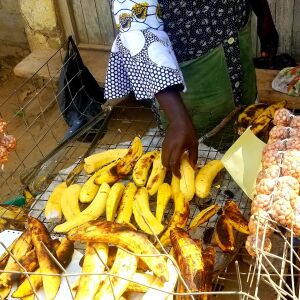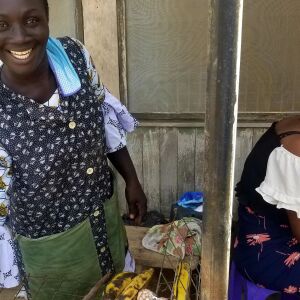ACCRA, Ghana—I am awakened by a crowing rooster like clockwork around 3:30 a.m. By morning birds whose songs rise with the cacophony that surrounds my new home away from home.
A rumbling heavy motor cracks dawn. Neighborhood dogs bark and howl. Big black-and-white birds flap above the coconut trees.
Already the doors of a nearby merchant’s shop are open. Human voices, adults and children’s, rise, greeting the early morning light.
Context is everything. And my American eyes, though having laid sight on Ghana before, see her more intimately now. As a resident rather than tourist, even if my visa is time-stamped and my departure from this land set.
I see poverty here, though only in substance. Hardship — devoid of a social safety net —which requires self-reliance and sweat equity, for a return that is often beneath subsistence.
I see it in the eyes of sturdy Black women who elegantly carry their wares in baskets atop their heads and dispense them to buyers in burgeoning traffic with the ease of a Vegas card dealer.
I see a people resilient. I see it in the eyes of taxi drivers, in the faces of women — and men— at innumerable makeshift shops of tin and wood that line roadways and are an economic lifeline.
The average salary of a Ghanian ranges from 1,280 to 22,600 cedis a month (or roughly $206 to $3,645 U.S.), with 75% of Ghanaians earning 12,600 cedis ($2,032) or less a month, according to Salary Explorer. A quarter of this nation’s employed population earn less than 2,680 cedis, or $432 monthly.
For some, like Isaac Acheampong, my recent 30-something-year-old Uber driver, the way to wages and a life beyond poverty is a daily, if not lifelong, uncertain grind.
With both parents deceased at an early age, he says he was raised by his then 70-year-old grandmother. A handsome, affable fellow, he hopes to marry someday but realizes the limits in a world where attention to daily survival is a consumptive affair. Right now, he says, he simply can’t afford a wife.
His words are rinsed with frustration as he snakes through the crater-laden roadway in his four-door Toyota Vitz. Not lost on me is his sense of integrity, honesty and willingness to give more than an honest day’s work for an honest day’s pay.
I tell him that in all of the poverty, lack and hardship I see here, that I also see their true wealth. I tell him that Ghanaians’ fortitude, sense of community, respect for their fellow man, and their work ethic remind me of how “we” used to be in America.
I explain that once upon a time as Black folks in America, we had more hardship than hope and that we now have more stuff but less substance. Poverty of the spirit.
I tell him that I wish I could bottle what I see here and take it back home to a world where 11-year-olds have become carjackers, where brothers gun down brothers in broad daylight over social media beefs.
And inasmuch as I reflect upon renewed calls for and interest in a “Back-to-Africa” movement, I cannot help but wonder whether it would be sufficient for us as a people in America to take back that human spirit and grounding born here in Mother Africa, which we as a people once held as gold.
Isaac drops me off at my door. I ask, how much? “Fifteen cedis…” I give him 25. “Thank you,” he says.
I am the one who is so grateful.
Grateful for my mornings here. For emerging clarity far removed from my daily U.S. middle- class grind, filled with grande Americanos and “luxuries” taken for granted: clean drinking water, reliable electricity, high-speed internet, and smooth roadways.
Grateful for the resilience I see upon the faces and in the spirit of the people here that stir within me memories of the way we were.
It is apparent in the old woman I encounter one evening ambling towards me, singing loudly praises to God. It is as clear as the walking evangelist who serenades my neighborhood some mornings with prayers and songs sung to his piping accordion.
They usher my awakenings, like the cock’s crow.
#justiceforJelaniDay
Follow John Fountain’s journey in Ghana on his website at: www.hearafricacalling.com
Send letters to letters@suntimes.com



















